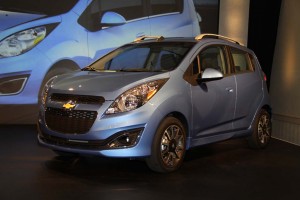As proponents of battery power like to envision the future, owners of electric vehicles will do their charging overnight when energy rates are lowest. But there’s an increasing sense that for battery cars to make the transition from niche to mainstream they’re going to have to operate a lot more like the conventional, gasoline-powered vehicles motorists are used to.
And that, acknowledges Doug Parks, chief of battery car programs for General Motors, will mean making it easy to get a quick charge-up during the day, much as one would pull into a gas station to top the tank. The problem has not only been coming up with a quick-charge system but ensuring that it will work with anyone’s battery-electric vehicle, or BEV, regardless of the brand.
That appears ready to happen. The basic charging technology is already in place and now, a consortium of five major automakers has come to agreement on a one-size-fits-all high-speed charging standard. That is likely, according to industry sources, ensure that the rest of the industry also signs on.
The group includes BMW, Daimler AG – the maker of Mercedes-Benz and Smart cars – Ford, General Motors and Volkswagen. The latter represents not only its own brands, such as VW and Audi, but also Porsche which has laid out plans for a number of plug-in hybrids and other battery-based products.
The agreement covers U.S. and Europe but may also carry over to China, where the Beijing government is making a major push to encourage automakers to migrate to battery propulsion.
In the U.S., President Barack Obama has been calling for the sale of a million battery cars – including so-called BEVs and plug-ins – by mid-decade. But while low-speed chargers are becoming more commonly available in public places, high-speed charging systems are a rarity that experts believe will be required in large numbers to encourage demand for such vehicles.
So-called Level III systems, which use 440-volt DC current, can give a vehicle like the new Nissan Leaf an 80% charge in as little as 15 to 30 minutes. Using the latest home chargers will still take as much as eight hours or more to charge up most battery cars.
Notably, Japanese makers like Nissan have not signed on with the consortium. Nor have several ambitious new start-ups, including California based Tesla Motors and Fisker Automotive. The former is about to launch a 7-passenger sedan, dubbed the Model S, while Fisker recently began selling its new Karma plug-in hybrid.
But the general direction appears to be towards standardization, which a statement from Ford says, “will reduce build complexity for manufacturers, accelerate the installation of common systems internationally and, most importantly, improve the ownership experience for EV drivers.”
Nissan, meanwhile, is reportedly working on a new charging system that can trim the time to fully recharge the Leaf to as little as 10 minutes, according to news reports. That would be more in line with what motorists can expect today when they go to fill an empty gas tank.
The maker is working with researchers at Japan’s Kansai University on the technology – though they fret it may take another decade to bring the concept to market.
Separately, Nissan plans to cut the cost of its conventional Level II charger, which uses 220 volts and can be installed at a Leaf owner’s home, to $1,800. The system had previously gone for $2,200.
Industry observers say driving down price will be another critical challenge to improving acceptance of battery-car technology.
(GM announces it will build an all-electric version of the next-generation Chevrolet Spark, debuting it in the U.S. in 2013. Click Here for that story.)

